#rocky soil plants
Explore tagged Tumblr posts
Text

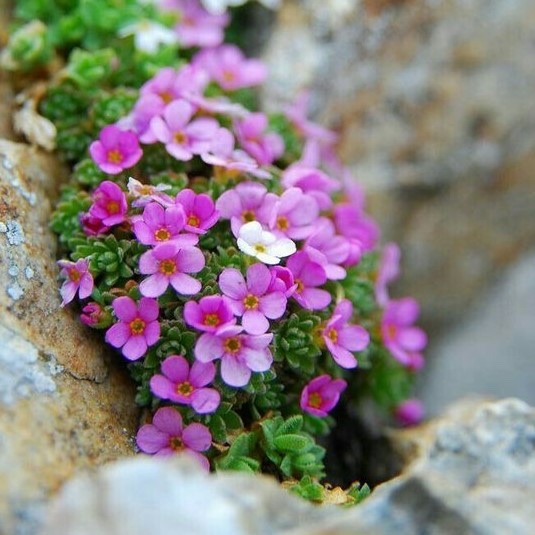
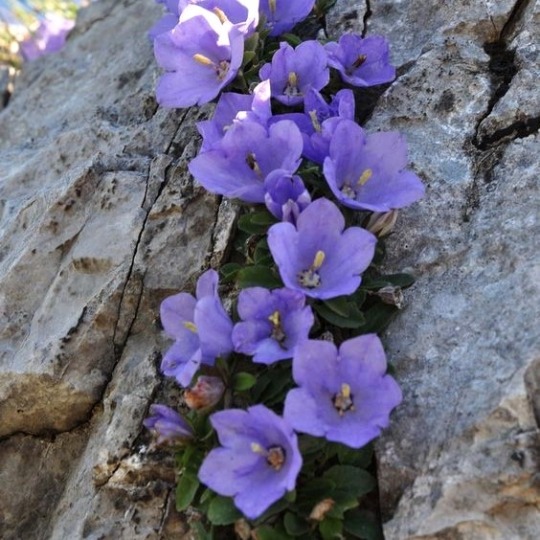

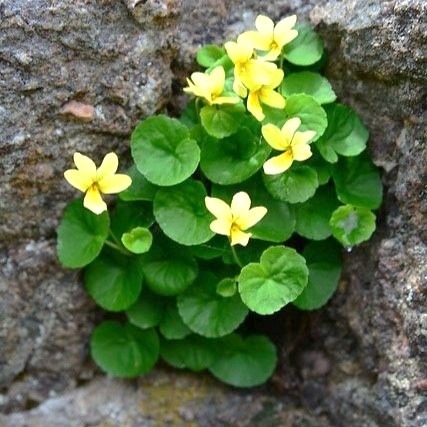
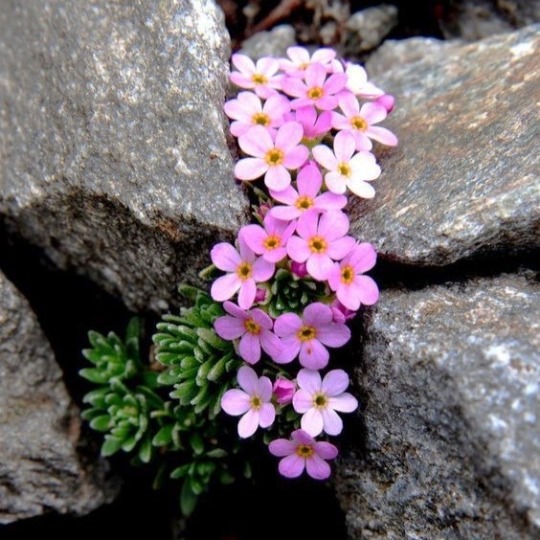
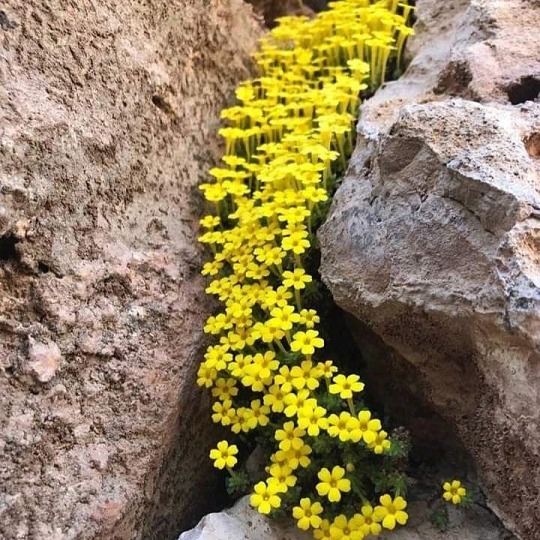
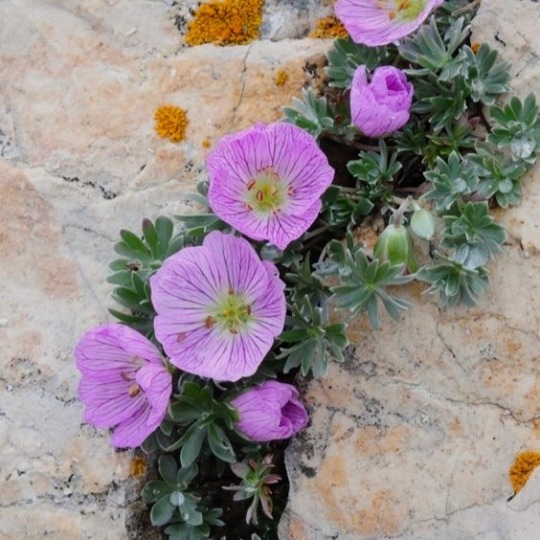
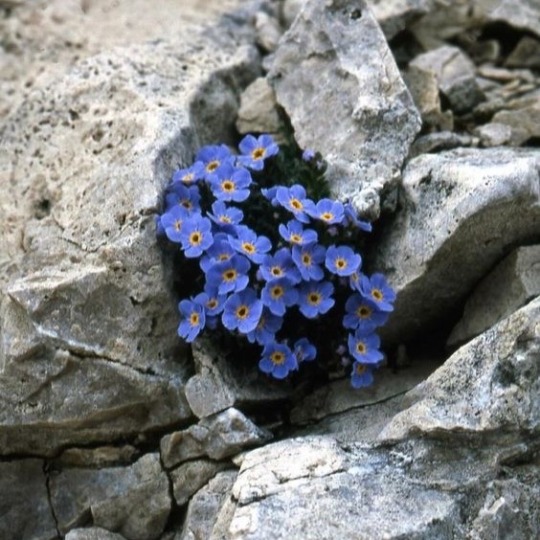
Through the thickest rocks, life always finds a way
#plantcore#nature#plant growth#wilderness#stone plants#flowers#rocky soil#rocky soil plants#flower growth#stone#flowercore#nature growth#stone flowers#nature moodboard#growing plants#nature magic#rocks#rock plants#plants#flower moodboard#grow-through plants#wild nature#flower aesthetic#flowers growth#moodboard#naturecore#wanderlust
89 notes
·
View notes
Text
hey does anyone know if there's any way to reap generously without sowing generously? i'd really like to reap generously but idk i kinda feel like it would be easier to sow sparingly lol
#i know i have to make an effort to see the fruits of my labor but i dont wanna!!!!#also im irl ordering crops for spring rn 🤣#and im being thrifty and cheap by ordering the smaller trees bc they're easier to plant and im broke rn lol#even tbo im wondering if i should also get 100 of the bigger ones they were so hard to plant last year 😖#but they look amazing this year ngl#anyway certified farmer post#this has been a shitpost#its not really a big deal bc i was advised to go w the smaller ones by a more experienced farmer due to the rocky soil#and he's right#but i want the immediate rewards of watching my trees get big faster :)#lol#also we keep sowing clover seed and its not really taking over the field as hoped so i need to order more and do tbat in the spring too#alas#fourth times the charm
4 notes
·
View notes
Text
APRIL IS NATIVE PLANT APPRECIATION MONTH
My favorite native tree is Arbutus menziesii, better known as pacific madrone!!!!

These trees are cool because they are one of the only broad leaves evergreen trees in the PNW. Their roots are famous for being finnicky, so they can be difficult or impossible to transplant. Many native plant nurseries don't sell them for this reason. They also love well drained, dry soils so you'll often find them growing on sandy or rocky cliffs near the ocean or the Salish Sea. Their bark peels away as they grow, leaving the smoothest texture imaginable behind. Give one a pet if you run across one!
162 notes
·
View notes
Text
I would've made more but I'm leaving for China in 3 days so I restrained myself to succulents. The moonstone might suffer a bit without being watered for a month (it'll probably lose its flowers u_u) but the lithops are fully plumped up and actually look a bit over watered to me and I probably won't need to water them again until autumn 👍 it's my first time keeping lithops so I'm a bit nervous but I'm going to stick to watering them only twice a year. Or even once a year. Also separating the lithops took me ✨2 hours✨ last night and this is why you don't keep your succulents in peat, kids.
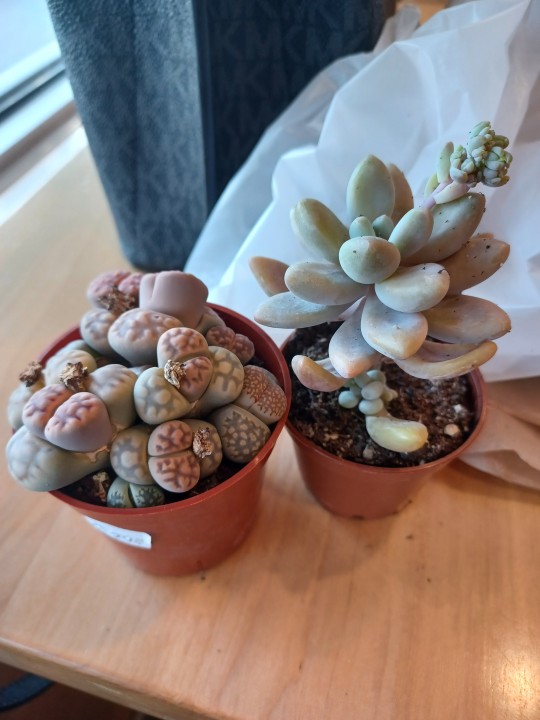
Anyway. Made some impulsive purchases yesterday.
#separating them would've gone faster if i had wetted the soil but I'm SO scared of adding unnecessary moisture to lithops#i got cactus soil but i might go to a home/garden store and get some gravel and perlite and mix in even more into the soil#because there's still peat in the perlite and im Worried about compaction and also about too much organic matter#these grow in very sandy and nutrient poor environments in the wild so too much Nutrience is not good for them#also gravel is good because it releases little bits of minerals and lowers the ph each time you water#lithops are nicknamed living rocks because they live in very rocky areas in the shade of other plants so... they feel comfy with rocks#they are the true pet rock#unfortunately i would not recommend getting this for your kids because they are so (purportedly) finicky#but who knows! maybe this is another orchid situation#plant rambles
9 notes
·
View notes
Note
Hi! I read your posts offering tips on how to describe dark coastal and academia settings. They were super helpful! I was wondering if you had any writing tips for dark forests..? Hope it wasn't too big of an ask. Thanks for your time!
I truly love this so much! I apologize for the delay in my post. I tend to put things off sometimes, I'm a serial procrastinator and it took me a little while to gather my thoughts on what you might encounter in dark forests. But hopefully these are similar to what you wanted!
✩°𓏲⋆🌿. ⋆⸜List of Random Things For Your Dark Forests Settings | For Writers
✩°𓏲⋆🌿. ⋆⸜
The Overgrown Trail 🌿
Winding dirt path obscured by tangled roots and underbrush
Twisted, gnarled tree trunks reaching up to block the sky
Shafts of pale moonlight cutting through the thick canopy
The distant hoot of an owl and the chittering of unseen creatures
The earthy, damp scent of decaying leaves and moss
The Abandoned Cabin 🏚️
Dilapidated wooden structure, its paint peeling and windows boarded up
Cobwebs draped across the porch railing and doorframe
The creak of warped floorboards and the groan of the sagging roof
Rusted tools and broken furniture scattered among the weeds
The stale, musty odor of neglect and the faint tang of rot
The Moonlit Glade 🌕
A small clearing, the grass blanketed in a carpet of wildflowers
Gnarled, ancient trees ringing the open space like silent sentinels
Faint wisps of fog drifting across the still surface of a dark pond
The soft susurration of leaves in the gentle breeze
The faint glow of bioluminescent mushrooms dotting the forest floor
The Winding Stream 🌊
A burbling brook cutting through the undergrowth, its water crystal-clear
Thick, twisted roots breaking through the soil along the banks
Schools of darting minnows and the occasional flash of a trout
Clusters of delicate ferns and mosses clinging to the damp rocks
The soothing sound of rushing water over the pebbles
The Ritual Circle 🕯️
A ring of large, moss-covered stones in a small, secluded clearing
Remnants of burned candles and wilted flower petals scattered within
Carved wooden totems or animal skulls adorning the perimeter
Thin wisps of incense smoke curling up towards the treetops
The eerie silence, broken only by the distant cry of a raven
The Fog-Shrouded Ravine 🌫️
A deep chasm obscured by tendrils of swirling mist
Gnarled, skeletal trees clinging to the steep, rocky sides
The faint sound of running water echoing up from the unseen depths
Thick vines and twisted roots snaking across the uneven ground
The chill of the damp air, raising goosebumps on bare skin
The Witch's Cottage 🧙♀️
A crooked, thatched-roof hut nestled between the twisted trees
Dried herbs and animal bones hanging from the eaves
Smoke curling from the chimney, the scent of charred wood and herbs
A small garden of nightshade, mandrake, and other sinister plants
The eerie cackling of the resident witch, her shadow glimpsed through the windows
The Forgotten Graveyard 🪦
Crumbling, moss-covered headstones half-submerged in the undergrowth
Skeletal tree branches reaching down like grasping hands
Ravens perched atop the weathered grave markers, cawing ominously
Shreds of tattered funeral wreaths and faded flowers scattered about
An unearthly chill in the air, as if the spirits of the dead linger
The Enchanted Pool 🌙
A small, still body of water reflecting the night sky above
Luminescent flora blooming along the murky banks
Schools of glimmering, ethereal fish drifting through the depths
Mist swirling across the surface, obscuring the view of the bottom
The faint sound of otherworldly music drifting from unseen sources
The Cursed Clearing 🕳️
A barren, circular area devoid of vegetation, as if scorched by dark magic
Twisted, blackened tree trunks surrounding the perimeter like sentinels
Jagged shards of obsidian-like rock piercing up from the soil
The crunch of bone-dry leaves and twigs underfoot, shattering the silence
An oppressive aura of dread and unnatural stillness permeating the air
#writing#thewriteadviceforwriters#writeblr#writers block#on writing#writing tips#how to write#creative writing#writers on tumblr#writers and poets#dark academia#dark academism#dark acamedia#dark acadamia aesthetic#dark acadamia quotes#fiction writing#writing a book#romance writing#writing advice#writing blog#novel writing#writing community#writing guide#writing characters#writing ideas#writing inspiration#writing resources#writing software#writing reference#writing tips and tricks
168 notes
·
View notes
Text


These pretty flowers are Trimezia jucnifolia (rushleaf walking iris). They're endemic to Brazil. The name "walking iris" comes from the unusual way that these plants spread: after flowering, the stem flops over and roots at the top, allowing the plants to "walk" along the ground. Although they have a pretty broad range across central and southern Brazil, these ones were found near Rio de Contas in the campo rupestre habitat. These rocky, mountainous areas are full of plants that can survive tough conditions, including nutrient-poor, rocky soil and frequent fires.
101 notes
·
View notes
Note
yeah yeah very nice and all the legend stuff and sky's upcoming stuff, but imagine riding warriors so hard and so well that he ends up whinning like the pillow princess we all know he is, like, i look at him and I just want to please him until I ruin his pretty boy face with tears of pleasure<3
Not gonna lie I wrote this like 6 different times cause something just kept feeling off. Turns out you just gotta get out of the forest every once in a while <3
Take a Seat
(Wars x Reader) Warnings: Self-explanatory smut with Wars having a boner basically the whole time. <3 Also a small tidbit of non-con touching.
“Watch out!!”
Wars quickly rolled out of the way, a large boulder crashing into the ground where he just was. The whole room shaking violently as he raises his shield, covering himself as more fiery stones rain down on him, threatening to crush him where he stands. He planted his feet, digging his heels into the rocky soil and using both hands to firmly keep the shield up as he tried to look for the others.
A sharp cry rang out and his feet started moving before he even knew who it was that had yelled. Through the flames he could see you crouched low on the ground, struggling to keep your shield over you as one of the larger rocks slammed down on you. Knees shaking as you fought to stay upright against the heavy weight before it hit the ground beside you. With a clear destination, he reached you in record time, sliding in next to you as he yanked you into his chest, shoving his shield up next to yours to create a larger barrier of protection over your heads.
“Are you hurt”
You shake your head, trying to make yourself as small as possible next to him as you both wait out the pseudo-storm that ends as quickly as it started.
Wars lowers his shield cautiously, helping you back up to your feet as a fire keese makes a dive for him. You quickly notch an arrow, shooting it down before Wars can get his sword back in his hands.
“Gods I can't wait to be done with this place!” Wars groans out, wiping sweat off of his forehead. “And if I have to see another one of those blasted bats I'm throwing myself in the lava!”
You snort at his dramatics, “You mean to say our mighty Captain can't take a bit of heat?”
Wars gives you his best smile, holding up his left hand that you knew had the large scar underneath. “Oh don't worry doll face, I'm hot enough for this whole mountain.”
You roll your eyes, giving him a playful shove as Wind calls you from across the room. “Come on guys! We found the exit!”
Everyone is quick to follow the young sailor along with Hyrule who lead you to the large exit in the other room. The midday sun stinging your eyes as you all crawl your way out from the depths of Death Mountain. Soot and dirt filled the air still far too warm for comfort. The only true reprieve being that there is no longer any active threat of being caught on fire or tripping into lava.
Layers of clothing were immediately pulled off the moment the opportunity presented itself. Cloaks and armour being the first things to go, followed by tunics, metal jewelry, shirts and any other fire protective clothing that was no longer needed
Bottoms stayed on. A hard and fast rule Time had set after a rather embarrassing incident a few weeks back that only some members of the chain were ever able to laugh about. Pants were exchanged for shorts though for anyone able to do so while most of the group settled for just settling with what they had.
Wars plopped onto a large boulder jutting out from the ground, rolling up the legs of his pants a bit before somewhat neatly storing his stuff inside of his bag. The smell of smoke was a pain to get out of clothes and Warriors groaned at the thought of smelling like a walking campfire for who knows how long. He just hoped that they would be able to do some laundry before the smell spread to his whole bag. Though he supposed if given the opportunity this very moment he probably wouldn't take it.
He was exhausted, and so was everyone else given the ways half of them were strewn about in various stages of napping which Wars was strongly considering joining in on. So he settled onto the ground, using the rock he had just been perched on as a backrest with arms loosely folded over his chest. He ignored the small rocks that dug into his legs, or how the rock was still a bit too hot against the bare skin of his back. He was just so damn tired that for once none of it seemed to matter. All that mattered was that his eyes were heavy, and his brothers were safe.
He did a quick scan of the group, mentally reassuring that they were indeed all safe as his eyes really only fell to you. You were a little off on your own and looked just as exhausted as he felt as you peeled off the last layer of your top to expose your bare midsection and a nasty red mark on your shoulder blade.
Oh you little liar.
With a new wave of energy, Wars shoves his hand into his bag. Rummaging through it till he finds the small canister of ointment and a large bandage before he moves to sit beside you. His fingers brushing your hair over your shoulder to take a better look at the blistering burn.
“Thought you said you were fine.”
“I am…or at least I was..” you murmur, pouting as you avoided eye contact with him.
Wars couldn’t help but chuckle. It was the same thing Mask used to do when hiding an injury from him during the war. The young hero, now grown ass adult a few feet from him, hated admitting that he needed help which had taught Wars to simply give it rather than trying to convince the kid he needed to simply ask for assistance.
Wars however, remembered a few seconds too late, that you were not Mask and was now stuck in a rather odd predicament.
Without thinking, he had reached over, scooped you right off the ground and straight onto his lap. Hands still poised around your hips as his mind began screaming at him the moment he physically felt your bottom press against the now growing strain in his trousers.
Oh no. Ohhhhh shit shit shit don't think about it. DON'T think about it!
Warriors took a deep breath, trying to remain calm while his heart rate skyrocketing. Hands quickly letting go of your hips like the contact had burned him worse than any of the fire monsters they had dealt with today.
You had gone impossibly rigid, hands placed down on his knees that kept some of your weight off of him. Spine so straight, one poke and it could snap in half.
Oh but you'd love to break her back under the right circumstan-
NO.
No. It would be fine. He was clearly just overthinking it. He was just trying to help you with your injury, nothing more than that. If he could just stay cool then there would be no need to panic.
You awkwardly turned your head to the side so you could see him. “Y-you don't have to-”
“It's fine,” He said with practiced ease. If there was one thing he was good at, it was hiding panic. And as you were already sat on top of him, it was too far to turn back now. “I don't mind.”
You nodded, still looking a bit skeptical but made no attempts to dissuade him. Taking that as a sign that you were indeed okay with him helping, he brushed away the lingering strands of hair and uncapped the bottle of ointment.
You winced at the initial contact, shoulders raised to your ears to try and flee from the coldness of the medicine. He tried again only to get a lessened version of the same reaction. It didn't deter him though, giving you a split moment before he gently rubbed it into your skin. His other hand, having found the curve of your waist, rubbing small circles to try and distract you from the stinging pain.
It didn't take long before your shoulders slowly dropped, the muscles along your spine relaxing enough till even your hands stopped supporting your weight. Letting you rest entirely against him as he applied more of the cream.
He had to bite the inside of his cheek to keep at bay the shiver that raced through him. Thinking of anything else besides the way your hips fit against his or how the goddess blessed curve of your ass pressed into him. And he definitely wasn't thinking about how much he wished he could just grab your hips and-
Oh Hylia he was so incredibly fucked.
He snatched up the bandage, having enough self control to apply it gently over the injury before practically shoving you off of him. Knees coming straight up to his chest as he prayed to Hylia that you wouldn’t see the large bulge you had just been sitting on.
“Uhm, thanks. That actually feels a lot better.”
“No problem.”
Neither of you looked at the other as Time called for everyone to start getting up. He watched as you walked off towards Four as he tried to come up with a quick solution to hide the rather obvious bulge. All he could think of was his shirt, so he begrudgingly threw it back on, wearing it loosely instead of tucked in so that it would hopefully cover it. And if anyone asked? It was simply to protect his skin.
_________
Wars sat on one of the tall bar stools in the Inns dining room, picking at the food he had been given though he hadn't taken a bite in probably 10 minutes. His mind too preoccupied with thoughts of you to concentrate on anything else.
He had avoided you like a pack of cuckoos the entire trek back down Death Mountain. Putting as much distance between the two of you as he possibly could until he could 1) calm himself down and 2) stop getting worked up every time he thought about it.
He was still working on that second one.
Adjusting his tunic for what felt like the 20th time that hour he sloshed back his drink, idling tapping on the now empty glass. The cool condensation sliding down to drip onto his fingers. Just like the way he could see the small beads of sweat roll down the length of your back. Wetting the plush soft skin underneath his fingertips despite the harsh environments. The way you fit so perfectly against him and Hylia the way your hips had moved. He wondered what sort of excuses he could come up with to get you on his lap again. Slowly building his way up till he could get you underneath him.
Wars hit his forehead, playing it off as simply trying to keep himself awake. He was still clearly exhausted, but after 2 hours of sleep evading him to replay the events of today in his mind on repeat, he decided to try and see if a snack and warm drink would help clear his head. Unfortunately it only seemed to have the opposite effect. Not only giving him space to freely think about you without the others around, but apparently encouraging it further into what could be happening if he ever decided to stop chickening out and admit his feelings for you.
Because he did. Not at first, though he has always found you attractive, but over time it was staring him in the face. To the way his stomach would do flips whenever you walked next to him, or how his heart fluttered at the sound of your laugh. And if you dared to smile at him? It was a miracle his heart hasn't stopped working.
He had fallen and fallen hard and it was infuriating.
He was the Captain, the strategist of the group that were all counting on him to keep it together. He couldn't afford to get distracted. No matter how badly he wanted to feel you against him. Grinding down on him so hard it-
He adjusted his tunic…again.
Its only gonna go away if you STOP THINKING ABOUT IT!
He crossed his arms on the counter in front of him, resting his forehead down with a frustrated groan. Might as well make himself comfortable here right? At the rate he was going it wasn’t like he was going to be getting any actual sleep soon anyway. A tap on his shoulder was followed by a thin hand resting on his bicep. He looked up to see 2 women standing on either side of him. Both had long brown hair though the one on his right with her hand on his arm had a much darker shade that looked almost black in this lighting. And both of them were currently looking him up and down like starving wolfos.
“Oh honey you are much too cute to look so upset.”
“Yeah, why so down handsome?”
Even with the odd tingling under his skin from where the woman’s hand was, Wars threw on his best smile for them, leaning back so that his arm slipped out from under her palm.
“No need to worry about me ladies.” He assured them with as much charm as he could muster. It was a poor attempt, one even they could probably see straight through yet it didn't seem to deter them as they both stepped a bit closer. One lightly grabbing his arm while the other dragged a finger down his shoulder.
“Awww, poor guy. We can always help cheer you up.”
“Mhmm I like that idea”
Gulping down the lump forming in his throat that felt too dry, he gently tried to push off their hands. Only for them to latch on to him again.
“T-that won't be necessary I can assure you.” He stammered out, stirring on his seat.
“Oh come on. What better way to get over someone than getting over someone else?” She whispered, tugging in his shirt a bit.
“Or between” The other purred in his ear and War's tried not to cringe at the proximity. He tried to laugh, playing it cool until he could slip away and go hide back in his own room with some of the others.
“Oh hey Ca- uhhh sorry didn't mean to uhh…interrupt?”
Maybe the Vet was right and Hylia did just hate them.
His neck spun so hard it cracked. Eyes wide as he saw you standing only a foot away in your night clothes. The ends of your hair still damp that left small wet patches on your shirt. Your eyes awkwardly shifted between him and the two women he was sandwiched between.
“(Y/n)! Hey, what are you doing down here?”
The two women finally let go of him, allowing him room to quickly beckoning you over. You come do so without hesitation, brushing right past the women who were now glaring at you with disgust.
“Couldnt sleep.” You stated, grabbing the hand that was still on his shoulder and flinging it off of him. “Figured I'd get a glass of milk or some. Why are you up?”
“Great minds think alike it seems.”
You hummed but your attention was still in the 2 women who seemed to need a more direct approach at being told to leave.
“Sorry, but can I help you?” You asked with a bite to your voice.
“Who us? We were just keeping your friend company.” Her tone eerily sweet as she tried to brush his arm again. You latched onto her wrist, shoving it away from him.
“How sweet of you. But it looks to me like you've overstayed your ‘welcome’ a bit. Have a good night.” You waved goodbye at them with a fake smile. Thankfully, they took the hint. Walking away with their eyes rolling and a short scoff.
“You have impeccable timing.”
“And you apparently really are too pretty for your own good.”
You both chuckle, the atmosphere around you lightening
“Can I buy you that drink for saving my ass?”
“*gasp* language Captain!” You tease, “but sure, why not.” You glance around, realizing that the only empty seats were on the other side of the room.
Maybe it was the lack of sleep or the drink he had earlier but for the second time that day, Wars brain didn't quite think through his actions. He snakes his arm around your waist, pulling you closer till you were between his legs and sat against one of his thighs. Unlike earlier though he made sure to keep enough space between you and him. Just in case.
You had other plans though. You leaned into him, wrapping an arm over his shoulders as you put whispered into his ear.
“Ya know Pretty Boy, if you want me to sit on your lap, all you gotta do is ask.”
Heat spread down to the tips of his shoulders and he gaped like a Hylian trout out of water. “I..I didn't…”
“I don't mind ya know,” the heat of your breath tickling against his skin. “There's a lot of things I'd do if you ask nicely enough.”
He swallowed dry air, that all too familiar stiffness returning beneath his clothes. “Yeah?” He whispered back, trying not to shiver when your hand lightly drummed on his shoulder. “Like what?”
He was playing with fire. Fire he should have dowsed hours ago. Weeks ago the moment he knew he had started catching feelings for you. But if you were the one to burn him he would run straight into the flames. So when you got to your feet, offering your hand to him he took it without question. Letting you lead him straight through the small room and up the stairs that creaked every few steps.
It was a blessing that Time has let you have your own room for the night. And a larger blessing that it only took a minute before you were opening the door and ushering him inside.
He could hear the door shut behind him as he strolled into the room. It was…a room. Bed, dresser, nightstand, everything a typical inn would have and nothing more. Feet planted into the wood floor it almost felt like he was back in training, standing at attention as higher-ups patrolled around to find any sort of flaw. He could feel your eyes on him as the distinct sound of the latch clicked into place.
“Well?” You asked. Fingers ghosting over his elbow as you came around to stand in front of him. “What do you wanna ask me?”
He cleared his throat, a bit nervous. “What can I ask?”
Your fingers left goosebumps on his arms as you ghosted over his forearms. “That all depends on what you want.” You explain, stepping forward till you were only an inch away from him. Wars lifts his hands, tapping his fingers against you as if to rest if he would be burned or not. But you were cool to the touch. A relief to the hot fire inside of him.
“Can I kiss you?”
You breathe out a yes, coming up on the tips of your toes to bring his face closer to yours. He grabs your face with both hands, lips ghosting over yours before kissing you softly.
It was soft, timid really. Not the kind of kiss you would expect from the group's so-called ‘ladies man'. But then again this was Wars and sure he could be flirty but deep down you couldn't recall a time he had ever tried to push for more than was given.
You deepened the kiss, swiping your tongue across his lower lip till he grants you access. He tastes like peppermint with the lingering hue of the alcohol you know he had earlier. You pull away, kissing a line from his mouth down to his neck.
“You could ask to touch me…or ask me to touch you if you prefer.”
“Surprise me” You chuckle at the slight trembling in his voice as your hands dipped beneath the edge of his shirt before lifting it up. He takes it off, tossing it aside before he reconnects your lips, hands beginner to roam up and down the curve of your sides. You sigh into his mouth, letting him snag your lip to give it a soft suck that makes you moan softly.
Pulling him towards the bed, you give his chest a soft push so he sits down, eyes looking up at you with a hazed curiousity.
“How about I take care of that little ‘problem’ you've had today hmm?”
His face is a bright red now which is cute as you grab his knees, pushing them open to slot yourself between them. Kneeling down on the floor as your hands rubb up and down his thighs. His breath hitching as he watches you unbuckle his belt, finger poised around the waist.
“Do you want me to stop?”
He shakes his head as you pull down, releasing his cock into the open air. Cheeks flushing as you lick your lips, dipping your head lower and lower till your mouth brushed against the sensitive skin. Wars titled his head back, gripping onto the sheets as your tongue licked him from base to head, swirling around the top before repeating the motions.
“Hah- shit.” He moans when your lips wrap around his head, slowly taking as much of him in your mouth as you can, using your hand the rest of the way till you reach the base.
Panting up at the ceiling, he leans back on his elbow as a hand comes atop your head that was now bobbing up and down. He stares up at the ceiling, knowing if he looks down at you, sees your beautiful eyes while his cock is in your mouth he'll be finished and goddesses he'd do anything to keep feeling your warmth mouth on him. But as you hollow your cheeks, sucking down harder he couldn't help himself. Fumbled curses leave his mouth as he looks down at you, his hips bucking up on accident that makes him hit the back of your throat.
“Fuck- s-sorry!”
Your eyes drag up to his, humming some sort of response that Wars has no clue the meaning behind. All he knows is he has to let go of your head, hand clenched so hard into the mattress his knuckles are white to keep himself from grabbing your hair and fucking your mouth.
He breathed out your name. “K-keep doing that and I-i wont last long sweetheart... ”
Hands gently grabbed your face, trying to guide you off but you swatted them away, pinning down his hips with a defiant stare that had him shaking. And when he felt the back of your throat again he came undone. Gasping your name as he came, watching as you happily drank it all down before finally popping off of him with a sly smile, wiping at the corner of your mouth.
Holy Hylia you were going to ruin him.
You opened your mouth for another snarky comment but yelped when Wars yanks you up to him, arms wrapping around your waist as he kissed you. He kicks his bottoms off the rest of the way, lifting your tunic off till it joins his clothes on the floor. His lips leaving yours to suck along your neck that made your knees go weak. Wars bends down, picks you up off the floor to lay you on the bed. Hovering over you as his mouth finds your chest, kissing the space between your breasts that were being massaged by deft fingers. Back arching when he pinches you nipple as they slid down to the top of your leggings.
“May I?”
“Please”
He pulls them down slowly, shimming himself down till he could kiss your navel. Hands spreading your thighs and without any warning his mouth is on your already wet cunt.
“Link~!”
Gone was the timidness from the first kiss. This man knew exactly what he was doing as he dived in, lips clasped around your clit to suck firmly. Your hand clutched onto his hair, tugging on it with the same force as his sucking as you panted.
“Should of done this hours ago” he murmured against you. The vibration of his voice only increasing the growing heat that seeped out of you that he was quick to lick away. “Goddesses you taste good.”
“Fuuuck! Link please I need you!”
“Eager much?” He teased. “What happened to asking nicely?”
“Fuck you- ha!”
Delivering a harsh suck he pulls himself up, kissing you gently. “Gladly.” You can feel him against your inner thigh, but a thought has you pushing against him, forcing him back till his ass hit the mattress. You crawled onto his lap, hovering just above the head of his dick that still leaked with cum and saliva. You teasingly slid down, letting it slide through your folds as Wars groaned.
You let your head fall to his shoulder, kissing along till you reached his throat. His arms wrapped around you, tracing up and down your spine as you slowly rocked your hips along his length.
“Seem a bit tense Cap, why don't you just relax and let me take care of you”
“Cant if you're gonna just keep teasing me like this sweetheart.” He said through gritted teeth as you lightly rocked back and forth.
“And you said I was eager~”
You pressed a kiss to the front of his throat, letting your tongue slide all the way up to his jaw. Wars shivered, grabbing onto your waist to try and lift you up. You let him, but stubbornly refused to lower yourself back down.
“Ah ah ah” You tutted into his ear. “Remember what I said? Ask nicely.”
You could feel his eyes roll, fingers digging into your sides as he tried to coax your hips back down. “Fiiiine,” He whined, letting his hands drop to your thighs, rubbing them apologetically. “Please?”
“Please what?”
“Can I feel you?”
Lips collided with his, capturing his bottom lip as you slowly lowered yourself on to him. The head of his cock prodded at your entrance before you let it slowly slip inside. You both moaned, hiding your face in his shoulder as your walls stretched to his size. You slid further down, going till he was completely buried inside of you.
“Holy Hylia. Youre so fucking tight” He groaned, pressing a few kisses to your temple. You stayed still for a few seconds, nipping at his neck before lifting yourself up and sliding back down, easily slipping into a slow rhythm
It only took a minute before the hero of warriors was a blubber mess beneath you. Moans and whines pouring from his lips as you kept up your pace. His hair a messily tossed around from when you had grabbed it earlier that completed the picture of the perfect hero being reduced down to a puddle by your touch.
You lifted your hips, letting him slide almost all the way out of you before slamming back down on him. Wars threw his head back as a loud moan was ripped from his throat. You smirked against his neck, doing it again and again, picking up your pace with each one.
“Fuck, please don't stop!” He whined, roughly grabbing your hips to help guide you up and down his shaft. You let him, focusing on your pace while sucking on the spot just below his ear. Hands dragging through his hair as you added a slight roll to your hips and you for a moment, you thought you had broken him.
Small tears rolled down his cheeks. His mouth hanging open as he heavily pants for air.
“Look at you, asking so nicely,” You cooed, watching the way he twitched at another rolled motion of your hips. “Keep making those sounds for me okay?”
He nods, whimpering as you praise him. His hips jerking upwards into you, slamming his cock further inside of you that hits just right. Your nails digging into his shoulders till the coil inside of you snaps. Liquid covering him and sliding down your thighs that burned as they continued to support your work.
“Shit Im..I’m…fuck (y/n) please~” He whined, hips jerking upwards again to meet yours.
“So polite” You teased, slowing down just enough for him to notice. “It's alright, tell me what you want.”
“Can I…? Please~, please I..Im so close”
“Since you asked so nicely” You picked up your pace, going faster than your original speed. Your walls clenched around him perfectly till tears ran down his face, mixing with the sweat that clung to his skin and now very messy hair. He brought his knees up behind you as he squirmed underneath you. You leaned down just enough to give another open mouth kiss to the front of his throat. “Cum for me? I wanna make you feel good.”
That was all he needed to tip over the edge. His body went rigid as you felt his cum squirt inside of you. You slowed your movement, working him through his orgasm until the exhaustion hit and you slumped against him. His arms wrapped around you, pulling you close as you both collapsed down into the bed. Keeping each other close as you're lulled into a blissful oblivion.
#link x reader#lu wars#warriors x reader#lu warriors x reader#warriors is such a pillow princess#link x reader smut#mdni#skippy.writes
117 notes
·
View notes
Text
Round 3 - Mammalia - Tubulidentata

(Source)
There are many fossil species within the order Tubulidentata, but today one family, Orycteropodidae, one genus, Orycteropus, and one species, Orycteropus afer, remain. Orycteropus afer is commonly known as the “Aardvark.”
The aardvark is a medium-sized, burrowing, nocturnal afrotherian mammal. They have a long proboscis, vaguely similar to a pig's snout, which is used to sniff out food. Each toe bears a large, robust nail which is somewhat flattened and shovel-like, and appears to be intermediate between a claw and a hoof. They use their sharp claws and powerful legs to excavate burrows and to dig ants and termites out of their mounds. The aardvark then uses its long (up to 30 cm (12 in)) tongue to lick up the insects. The aardvark is pale yellowish-grey in colour and often stained reddish-brown by soil. They have tough skin and a coat of thin hairs. The hair surrounding their nostrils is dense to help filter out dirt as they dig. Aardvarks can run fast in a zigzag fashion to evade predators, making for the nearest burrow. If a burrow is too far away, it can quickly dig a new one. If all else fails, they will strike with their claws, tail and shoulders, sometimes flipping onto their backs lying motionless except to lash out with all four feet. They are capable of causing substantial damage to unprotected areas of an attacker. If attacked in a tunnel, it will escape by digging out of the tunnel thereby placing the fresh fill between it and its predator, or if it decides to fight it will roll onto its back, and attack with its claws. Aardvarks are typically around 105 and 130 centimetres (3.44–4.27��ft) long, and can reach lengths of 2.2 metres (7 ft 3 in) when its tail is taken into account. It is 60 cm (2 ft) tall at the shoulder, and has a girth of about 100 cm (3.3 ft). It typically weighs between 60 and 80 kilograms (130–180 lb). Aardvarks are found over much of the southern two-thirds of Africa, avoiding areas that are too rocky.
Aardvarks can live solitarily or in small family groups. They have polygamous breeding behavior. Males do not play a role in raising young, only staying with the female during the breeding season. After a gestation period of seven months, one cub weighing around 1.7–1.9 kilograms (3.7–4.2 lb) is born during May–July. The cub is able to leave the burrow to accompany its mother after only two weeks and eats termites at nine weeks, but is fully weaned between three months and 16 weeks. At six months of age, it is able to dig its own burrows, but it will often remain with the mother until the next mating season, and is sexually mature from approximately two years of age.
Orycteropodidae arose in Africa in the Early Miocene epoch, and spread to Eurasia later in the Miocene. Most of the family's diversity had become extinct by the end of the Pliocene. The genus Orycteropus is known from the Late Miocene, with Orycteropus afer itself arising in the Early Pliocene, and surviving into the modern day as the last representative of its lineage.

Propaganda under the cut:
While the aadvark eats mainly ants, especially the Common Pugnacious Ant (Anoplolepis custodiens), switching to termites in the Winter when ants are less common, there is one fruit the aardvark eats. This is the Aardvark Cucumber (Cucumis humifructus), which is reliant on the aadvark to eat the fruit in order to spread and re-bury the seeds of the plant. The time spent in the intestine of the aardvark helps the fertility of the seed, and aardvarks then bury their feces, so the seeds are only able to germinate with their assistance. In the meantime, aardvarks get much of their water intake from the cucumber. This plant may be the reason the aardvark is the only ant and termite-eating mammal that has retained functional cheek teeth.
Emerging from its burrow at sunset to begin a night of foraging, the aardvark will trek over a considerable home range encompassing 10 to 30 kilometres (6.2 to 18.6 mi), nose to the ground and ears forward, listening and smelling for ants and termites. They zig-zag as they forage and will usually not repeat a route for five to eight days as they appear to allow time for the insect nests to recover before feeding from them again.
The aardvark is known to be a good swimmer and has been witnessed successfully swimming in strong currents.
Aardvarks have one main burrow and several refuge burrows scattered throughout their territory. For safety, the aardvark will change the layout of its home burrow regularly, and periodically move out and make a new one. Old aardvark burrows are prime real estate for African wildlife, and are used by African Wild Dogs (Lycaon pictus), Ant-eating Chats (Myrmecocichla formicivora), Egyptian Slit-faced Bats (Nycteris thebaica), warthogs, hares, mongooses, hyenas, owls, pythons, and lizards. Without these refuges many animals would die during wildfire season.
Recent research suggests that aardvarks may be particularly vulnerable to alterations in temperature caused by climate change. Droughts negatively impact the availability of termites and ants, which comprise the bulk of the aardvark's diet. Nocturnal species faced with resource scarcity may increase their diurnal activity to spare the energy costs of staying warm at night, but this comes at the cost of withstanding high temperatures during the day. A study on aardvarks in the Kalahari Desert saw that five out of six aardvarks being studied perished following a drought. Aardvarks that survive droughts can take long periods of time to regain health and optimal thermoregulation, reducing the reproductive potential of the species.
The ancient Egyptian god Set, the god of the desert, storms, chaos, violence, and foreigners, is often depicted with the head of an unknown animal, called the “Set animal” by Egyptologists. The animal has a downward curving snout, long upward ears with squared-off ends, a thin, forked tail with sprouted fur tufts in an inverted arrow shape, and a slender canine body. One of the proposed animals that this could depict is the aardvark.
88 notes
·
View notes
Text
The Witch's secret ingredient
✾ Couple: female Witch Reader x male Dragon
✾ Trigger warnings: shameless Smut
✾ Word Count: 1579
✾ English is not my native language. If you find mistakes, feel free to tell me, but please be nice about it.
For quite a few years, you had been the city’s local witch, brewing potions and other remedies for the locals. With pride, you could now call yourself an expert in the fields of Alchemy, knowing about the ingredients, their properties, and where to find them. The citizens trusted you and your days had become rather busy as you had forged good relationships with them, causing a lot of them to become regular customers.
When you did not spend your time behind the shop’s counter serving customers and brewing concoctions, you were out in the woods stocking up on supplies or getting yourself a well-deserved break from the city’s troubles.
Currently, you are at the edge of the forest, collecting blue Vervain that grows in the moist soil along the path. The stiff green stems carry panicles of flowering spikes packed with small purple flowers. Paired with the right ingredients, it is used to cure a handful of pains, aches and insomnia. You had always found this plant to be beautiful, and it was probably one of your most used components.
Plucking a few of the stiff spikes from the stems, you place them inside the woven basket that you always carry with you when you leave the city. Inside it, you have placed a few empty glass bottles which you would need for another ingredient, one you are most famous for, as it is as rare as it is dangerous to obtain.
Your Dragon seed potion has earned you a lot of praise and boosts stamina and potency in men. It always sells out quickly, and you had many grateful women visit your shop to praise its effects and thank you personally.
Every two weeks you made your way up into the mountains to harvest more of the Dragon seed, a dangerous task that other witches avoided, making you the only one to sell it.
As you near the rocky clearing, you hear the first distant roars and the sound of giant wings cutting through the air. It is only when an enormous shadow rushes past you that you halt in your steps, taking in the majestic creature as it soars through the sky.
The Dragon lands on the ground in front of you, sending shivers through the ground, dust and debris whirling through the air. By now, you are familiar with the black scales that carry a slight purplish hue as they glisten in the sun. Flaming red eyes focus on you while its raspy breath fills your ears.
“So the little witch visits us once again!” a deep voice resonates from his lungs.
“What is it you seek this time?” he asks, even though he is already well aware of the answer. You could swear that his maw carries a knowing grin as he forced you to voice your desire every time you came here.
Many months ago, you had forged a deal with the Dragons, they granted you their Seed and in return, you had offered them the only thing that seemed a fair price, your Body. It had turned out to be a mutually beneficial exchange, as female dragons had become a rare sight.
“Kradan” you say the Dragon’s name, his eyes glowing as he listens to your words.
“I have come to once more make use of our agreement. I seek to harvest your seed,” you exclaim while resting your basket on the floor, retrieving one of the empty bottles.
“In return, I will offer you and your Kin my Body!” You loosened the buttons of your dress, causing it to brush down your body and collecting in a pile of ruffled at your feet.
Kradan lets out a low grunt as his head closes in on your now nude body. His giant nuzzle brushes over your skin as he inhaled your scent, your growing arousal filling his nostrils, stirring his own lust.
“We accept,” he growls, his tongue gliding over your chest, caressing the contours of your breasts. You hitch a breath, instinctively grabbing the horns, which grow from his head, for support.
His muscle keeps wandering the contours of your body, gliding along your hips, over your thighs and finally between them, forcing a hissed breath out of your lips. Forcefully, he parts your lips, gliding back and forth over your clit and your entrance.
You moan loudly, parting your legs for Kradan to grant him better access, your hips slowly moving against his tongue. “Oh, fuck!” by now, you know it won’t take long for you to cum as his tongue rubs over your sensitive knot, sending waves of pleasure through your body as it pulsates with every move.
He grunts out his own arousal as he suddenly lifts his head into the air, taking you with him as you hang onto his horns, your legs wrapping around his nuzzle as he continues to eat you out. Trusting in the strength of your legs, you slowly let go of his horns, arching your back as your upper body now dangles loosely in the air. Your hands glide over your breasts, caressing the soft skin as your moans fill the clearing.
Your heated core tightens and you feel yourself getting closer to completion. “More…almost there” you pant, causing him to growl into your body, sending a wave of vibration through it that makes you topple over the edge. Your clit is pulsing as you cry out your pleasure, the orgasm washing over you in rhythmic waves that causes your toes to curl.
As it fades, he lowers you down onto a flat rock, your body now lying beneath his enormous frame. Between his hind legs, you spot his large pink erection, and you can’t wait for it to finally fill you up. You roll onto your belly, lifting your ass into the air, the lust in his eyes burning.
Having sensed your desire, he climbs over you, lowering his hips, so his cock is now hovering over your entrance. “Are you ready for me, little witch?” he asks, his deep, raspy voice filling your ears.
“Ye…..s” before the word has left your mouth, he thrusts into you, his enormous length stretching your walls as it glides between them. You feel the air being knocked out of your lungs by the immense pleasure you feel. Not able to moan, you try to catch your breath, a faint whimpering leaving your mouth. “Fuck fuck fuck….so big” you squirm, your legs shaking, barely supporting your body.
He is not gentle with you, he has never been, and you absolutely love it. A dragon’s passion is insatiable, and you can’t deny that for the past two weeks you had been longing for this day to finally arrive.
Kradan moves his hips back and forth, a wet slapping sound filling the clearing, your stomach bulging as his shaft moves inside of you. Your lungs exhale strangled moans, your fingers wrapping around the edge of the rock, searching for support. It doesn’t take long for your next orgasm to approach, your walls spasm around his cock as the heat spreads into your jelly like legs. Strands of your (y/hair color) hair cling to your sweaty skin.
He is not finished with you, instead he speeds up his pace, burying his length all the way inside of you. Inhaling sharply, you arch your back, moaning out your breath in pleasure as he fills you out completely. “Oh gods, please fuck me harder,” you plead, causing him to grunt out a laugh.
“You’re almost as insatiable as our females used to be, I have to give you that much. Maybe you were a Dragon yourself in a past life!” he pounds you roughly, his voice lined with his own pleasure.
“Come on, show me how well you can take it, little dragon!” he grunts, his tongue brushing over your back as he exhales a gust of warm air. Goosebumps trail down your skin and you feel a heavy weight on your back as Kradan pins you down with one of his enormous claws. Over and over, your walls contract around his shaft as it hammers inside you in a fast, steady rhythm, his aroused grunts vibrating through your body
He makes you cum several more times before his own arousal causes him to topple over the edge. He pulls out of you, as you place one bottle at the tip of his length, the white seed shooting out as he raises his head into the sky and breathes out a fountain of flames.
The bottle fills quickly and with the bit of strength that is left in your body, you close it with a cork. You collapse onto the ground, your chest panting heavily as he lowers his colossal head down to you, the warmth of his breath once again brushing over your skin.
“Well done, little Dragon” your hand gently strokes over his scaled snout. In the distance, you can hear the roars of the other dragons and the flapping of giant wings.
“It looks like my brethren have sensed your arousal,” he speaks and you could swear that his maw carried a smirk. “I hope you are ready for them, as they are just as hungry as I was.”
Your heart flutters in your chest as Kradan lifts off into the air, a heavy gust of wind blowing your (y/haircolor) hair out of your face. In the Sky, you spot another group of approaching dragons.
#teratophillia#monster x human#monster kink#terat0philliac#smut#dragon x reader#reader x dragon#size k!nk
85 notes
·
View notes
Text
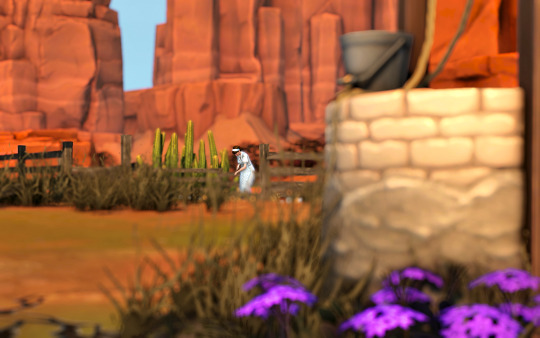


A new year began with fresh crops sown into the dry ground of Strangerville. After months of irrigation and soil monitoring, Zelda had expected this harvest to spring to life much more easily than the first. Only compared to the dark ground of England, which had always seemed to come back to life after the spring rain, life here seemed utterly unwilling to offer any help to the people struggling to get by, even as their next batch of crops sprung tenuously from the ground.
As she worked on them day after day, Zelda tried to listen for her father’s voice as she once did, only the cacophony coming from her own mind just kept growing louder. It’s barren. The soil is barren. Just stop trying, there’s no point. Just give up. But she couldn’t. Not for herself or Gio or her family. She had to keep tilling, even if every movement was heavier than the last. Each month as the small plants struggled to grow again, the voice grew louder, until it was hard to remember what all this work was for or that she had succeeded once before.
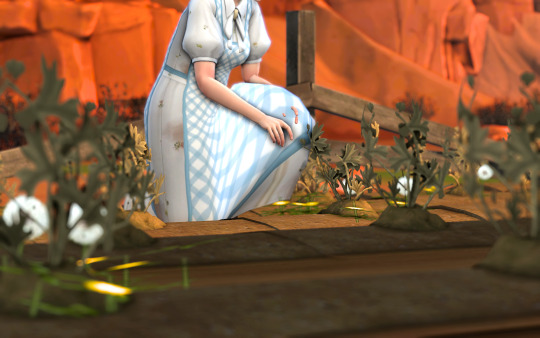
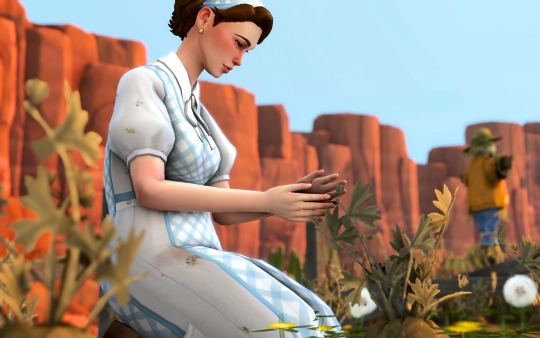
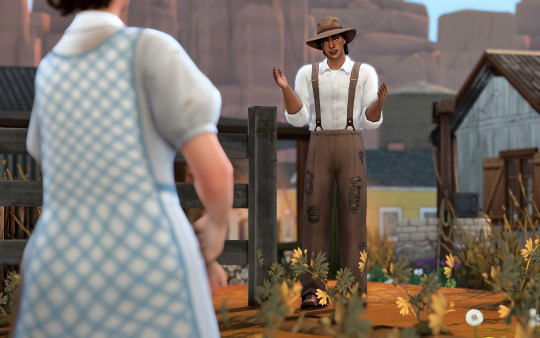
Zelda bent down into the compacted sand, reaching for a weed as she tried to throw herself into the work and quiet her mind. But the dry brown leaves were so unlike the verdant green stems of months before that the voice in her mind grew even more desperate. Just because it happened once doesn’t mean it’s going to happen again. Sometimes that’s all it has to give. Sometimes there’s nothing left. Just give up.
A voice calling her name somewhere from the driveway tried to break through her reveries, but she was lost in the rocky soil as it ran through her fingers back over the dry plants, Just give up. Isn’t she enough? He loves her. You love her. Just give up, be happy.
“Zelda!” She lifted her eyes to see Gio at the fence, a large smile on his face as he waved his hands excitedly. She stood and brushed the soil from her hands but not the thoughts from her mind as she moved to follow him across the yard.


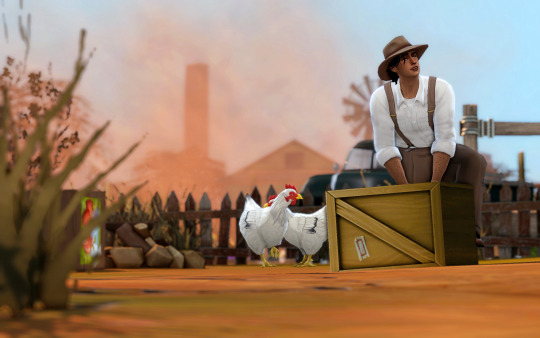
His steps were filled with purpose and vigor as he walked through the farmyard, calling out to Jo as he passed the house. She emerged with tired, disinterested eyes just as he reached the bed of his truck, lifting up a wooden box he had there and parading it through the farmyard proudly.
Under the watchful eyes of two exhausted woman, he set the crate down onto the ground as though it were more precious than gold. Moments later two hens walked out into the orange sand, their white feathers gleaming against it brightly. Zelda gasped and clapped her hands, the sheer sight of hope quieting her mind temporarily. But from the shadowed safety of the porch, Jo looked down at their devilish eyes and murderous claws with disdain, “A chicken, Gio? Where in the hell did that come from?”

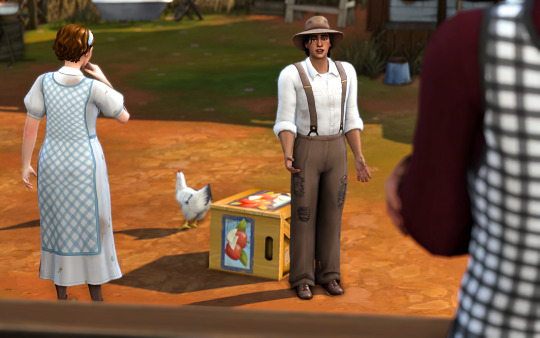
Gio was seemingly unaffected by her aversion, “Chickens, Jo, chickens! I mean hell, we’ve lucked out now, you know that? I was down at the feed store, when I got to talking to a family who’s about to head West on the route. They were worried about takin’ them since they couldn’t feed ‘em but it’s not like killin’ them woulda done any good either. Then I remembered all those jars and preserves the both of you made…”
As he went on it about how he had negotiated both of the chickens in exchange for bushels of dried corn and jarred peppers, it became clearer to Jo what a victory this was not only for them, but for him. He had brought this home like a prize won for them, a small contribution to give their lives ease. She felt her hatred of the hideous creatures begin to shift in favor of love for him, only for him to look back at Zelda and then at her, “But none of it would have been possible without either of you and all your work.”
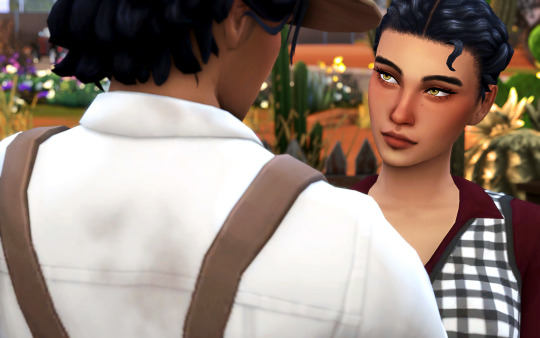

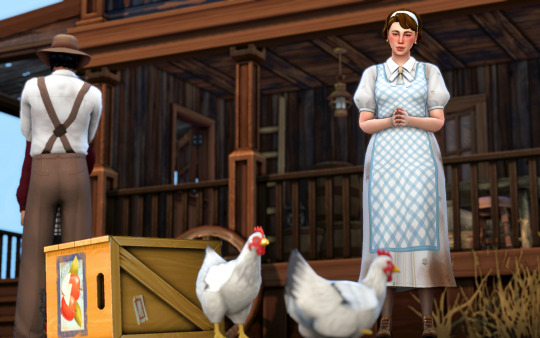
What was left of her desire to walk away and ignore the sight before her melted at the gratitude in his voice, and she finally left the recess of the porch to walk to him. For a moment she looked up at him, forgetting that Zelda was there as she let him wait for some form of praise from her. Then a small smirk broke through her unreadable expression and she pointed over his shoulder, “I do adore them, so long as I’m not the one to tend to their beady little eyes.”
Gio responded with a wide smile, and for a moment Zelda was distracted by the way they looked at one another as they laughed, so familiar and laden with meaning that it made her wistful; but then the glimmer of white feathers caught her eye yet again. The chickens pecking at the dry ground didn’t look like prehistoric horrors to her. They looked like hope, like her mother’s prized flock or mornings without hunger. Maybe even birthday cakes for her daughter.

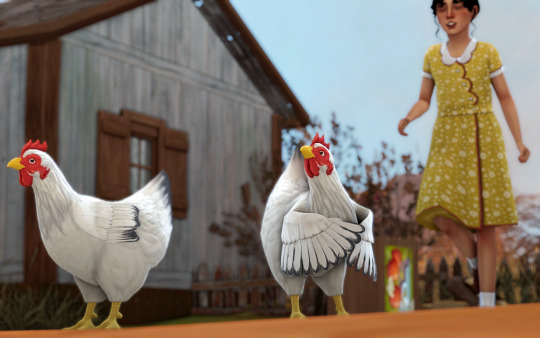

Her thoughts were interrupted by Violette herself, who stormed out of the house like a tornado at the first whiff of novel hubbub outside her window. She saw the chickens walking in the sand and gasped, excited by their quick movements and new presence. “Are they ours, Momma? Can I play with them?”
Before Zelda could say a word Violette ran forward, as unafraid as any farm child but without any of the knowledge that Zelda and her siblings had possessed in their youth. Zelda felt the paralyzing wave of anxiety that she always did when she was meant to discipline Violette. She needed to tell her to stop, to show her how to handle the chickens properly and not to be so dangerously brash. Only she couldn’t seem to find the words, and part of her knew that even if she did, Violette would ignore them anyway.
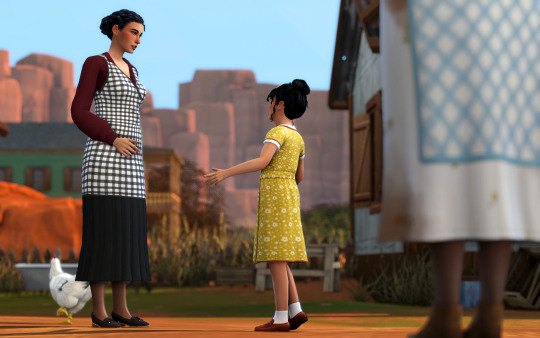



But before she could even take a step, Jo was in Violette’s path. Whatever aversion she had for the small creatures moments before was now gone as she stepped between them and the brash child threatening to pick them up and be scratched bloody by their overexcited claws. Violette looked around her aunt’s legs wondering if she could make a run for it, but Josephine’s stern glare was enough to stop her from even trying.
Zelda watched them as Jo shut down all of Violette’s attempts to bargain with her, the same coy looks and innocent smiles that worked on her father and she didn’t even bother using on her mother. Finally, defeated, Violette let Josephine grab her hand to guide her after the chickens to watch them from a distance. Before they walked away, Josephine looked back to Zelda as though to say, I’ve got her. Don’t worry.
Zelda returned her wordless reassurance with a grateful smile, one less fear on her mind as the lifeless soil called. Because she had to keep trying, just as much for herself as everyone else. Only it was a bit easier now knowing that Jo was there, that she wasn’t alone in raising Violette and that both of them were in this life trying in their own way. Even if they didn’t fully understand exactly what the other was struggling toward, at least they had that.
Previous / Next
#1933#sims 4 historical#ts4 decades challenge#ts4 historical#sims 4 decades challenge#the darlingtons#sims 4 legacy#ts4 legacy#sims 4 story#ts4 story#1930s#Zelda darlington#Josephine Duplanchier#Giorgio Mistretta#Violette darlington
138 notes
·
View notes
Text
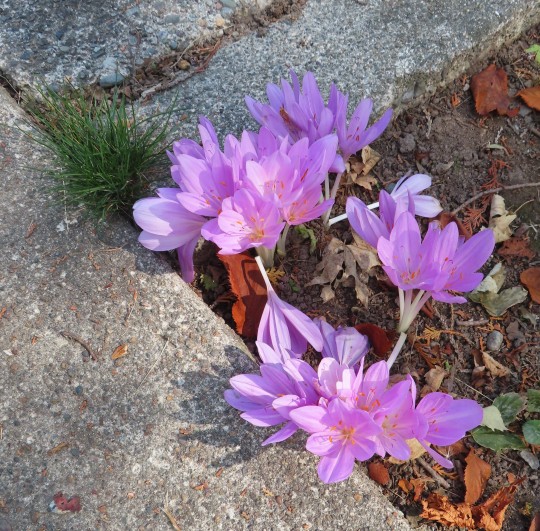
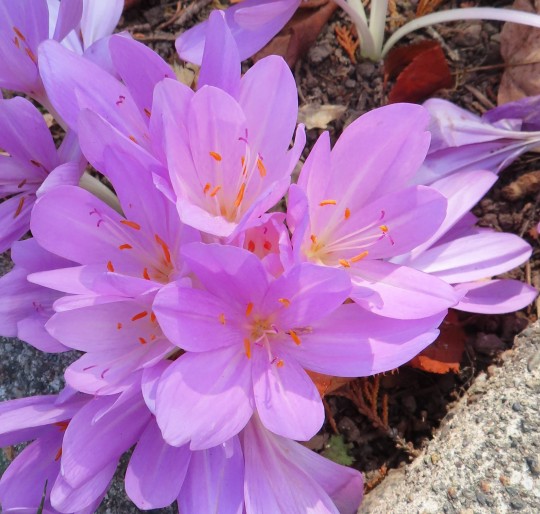
Colchicum autumnale (autumn crocus)
The autumn crocus is unique because it has no leaves when it blooms. The plant's 10-inch long, dark green leaves emerge in the spring and die by early summer. The plant seems to go dormant until the fall when the flowers emerge from the ground.
The autumn crocus is a very low-maintenance plant. It doesn't have any serious pest or disease issues, and its deadly poisonous, so rabbits and deer leave it alone. However butterflies and bees regard autumn crocus as a delicious treat at a time when many summer flowers are beginning to fade.
Colchicum autumnale grows fine without additional fertilizer and prefers sandy loam or rocky soil in a well-drained location. These details tell us much about this plant's history. Before it was adopted by kindly human gardeners, this European plant must have led a hard life in a difficult environment.
#flowers#photographers on tumblr#autumn crocus#autumn#pink#fleurs#flores#fiori#blumen#bloemen#vancouver
278 notes
·
View notes
Text
Aylin/Isobel Week, day 2

vengeance, service, devotion, protection
rated t | 2000 words | Aylin, Isobel
read on AO3, or below the cut

Lunaed Adiutor (also known as silverwort, mus tel’e’thal, glow-wort, or Selûne’s Footprints) is a relatively rare plant of the Lunaed family. It is a silver, downy plant with low stems, rhizomes, and a strong herbal scent. It is tolerant of wet or dry climates, though it prefers areas with sandy or rocky soils. It appears often in the company of oaks or conifers.
It is prized for its many practical uses. Like other Lunaed plants, L. Adiutor is luminous under conditions of extreme darkness.
☽︎
She finds the book under rubble and char. It’s half-burnt itself, cover blackened and pages ashen at the edges, but once opened it proves to be a surprisingly intact little guide to herbs.
A crumbling ribbon marks a spot in the well-thumbed pages. Isobel flips to it, reads the passage. Black and white illustrations of leaves, flowers, rhizomes fill the opposite page, and she studies them with a surprising swell of homesickness.
She doesn’t need the pictures, of course. Them or the written entry. She knows it already: silverwort, mus tel’e’thal, ‘healer’s friend.’ It grew in Reithwin, at the sandy banks of the river; all the summers of her childhood smelled of silverwort and cedar. She can still feel the soft-furred leaves, the stickiness from crushing them between finger and thumb.
She slips the book into her pack.
They move on.
They travel occasionally with larger groups: other travelers met on the road, farmers and merchants with laden carts that offer to carry them to the next town or village, pilgrims who recognize those similarly devout.
More often, however, it’s just her and Aylin, trudging together across the land.
They have their goal: to find those who target Selûne’s holy enclaves.
They will not be dissuaded.
Silverwort is a key component of many minor Selûnite charms. Its uses are as many and varied as stars in the sky, but the most popular, of course, are spells to protect against Shar’s darkness.
☽︎
Is it luck, or is it fate? Two days out from the hamlet of Colmore, two days of pitted roads and ceaseless rain, they find footprints. Before another’s passed, they’ve caught up enough to see the other travelers for what they are: Sharrans. They’ve made camp just off the road, small campfire guttering weakly against the rain.
“Two guards,” Isobel murmurs. The Sharrans have placed themselves in a small dale; an advantage against the wind, but not against Selûnites. She and Aylin crouch now at the crest of it, shrouded by thin rain and heavy brush. “A cleric. What’s the last?”
“A hopeful.” Aylin’s response comes through clenched teeth. She is still in a way that is not steady, still like ice before the crack, as they watch the Sharran group.
A hopeful. Isobel hasn’t seen many before, but she recognizes now the bleak uniform of the novitiate.
She knows, too, why Aylin would recognize the simple robes, the void-blank novice amulet, and is struck with rage and sorrow mingled.
“Shall we continue to tail them?” she murmurs. “Wait til they close on Vinsir, then loop around and alert the enclave first?”
“We have no need for Vinsir’s help,” Aylin hisses. “We strike now.”
Isobel nods shortly. “Selûne, guide my hand.”
The guards fall swiftly to Isobel’s spells, too surprised by the onslaught to even retaliate. The cleric follows shortly under Aylin’s smiting blade.
The fourth, the novitiate, scrambles away. She darts across the small dale, leaps back with a yelp as fine bright lightning shoots from Isobel’s fingertips. The lightning misses – but Aylin does not, reaching out to seize the Sharran by one thin arm.
Her mask – an amateur’s blank mask, dark and featureless as the new moon – sits crooked on her face, knocked askew by the fighting. She moves to fix it, but with a single, harsh gesture, Aylin bats it away instead. It falls to the ground, splashing Isobel’s hem with thin dark mud.
Round eyes. Snub nose. Sweat-soaked curls that cling to her temples where the mask once pressed. The novitiate is a half-elf barely out of childhood, younger than either of her captors.
“Where were you bound?” Aylin growls. “A cloister, a rendezvous? Speak!”
“Wretched weevils of the moon-bitch,” the girl snarls. “Craven fools clinging to lies and fatuity, too feeble to embrace the dark. Shar will carry me to loss, and I will be whole. You will die like moths…”
Her insults are vehement but stilted: a parrot passionately fumbling to recall what should be rote. It’s a discordant performance, and Isobel is sickened.
“Cease!” Aylin raises her sword in warning. “Shar cannot help you now, girl. Tell us–”
The novitiate spits in her face. Aylin grimaces.
“Enough of this,” Isobel says. “We’ll take her to the enclave in Vinsir.”
“No!” The hopeful thrashes in the knight’s strong grip; when that doesn’t work, she begins to shout. “Shar, teshuel vian lyth! O Nightsinger, yewl salen dath! Teshuel nae tel suor'nevae–”
Common Elvish, but spat in panicked haste too frenzied for Isobel to follow. A spell, a curse? It doesn’t matter. Isobel raises her hands, magic gathering in her palms, and envelopes them all in Silence.
The Sharran slumps forward.
With one hand Aylin holds her upright; the other is tight around the hilt of her sword, blade buried in the Sharran’s belly. Her beloved’s face is grim, features twisted with fury. The Sharran tremors against her, eyes wide. Her lips keep moving, praying mutely, even as blood drips from them.
There are no answers. Not from the dying hopeful, nor from the other three dead on the ground. No journals or diaries among their belongings, no penned missives or convenient notes. They are as they were, hands full of empty vengeance.
Silverwort is well regarded for its healing abilities. It is an exceedingly potent herb, used in both external ointments and poultices and internally ingested draughts, tinctures, and teas. Even a single leaf is said to alleviate a variety of maladies.
☽︎
They travel light, only carrying what they need: a change of undergarments, a shared bedroll, enough food to get to the next town.
Isobel insists, however, on stopping when they notice healing herbs. They find a meadow full of rose balsam, and spend hours filling their packs with the fragrant leaves.
“What a fine alchemist my Isobel is!” Aylin proclaims that night, and Isobel laughs.
“It’s as easy as brewing tea.” Which is all she’s really doing: muddling the leaves between her fingers, boiling them with a handful of barley, until she’s made a thick tisane.
She boils that down until their little cookpot’s full of something closer to syrup than potion, as potent as anything. Aylin, armor-clad and afraid of nothing, not even kitchen burns, holds the bottles as Isobel finally removes it from the fire and fills each glass vial to the brim.
But it’s not enough. It’s never enough.
Villages wracked with shadowy illness, clotted with a befouling darkness. Crops failing, fishing nets empty, children coughing, wells once fresh and clear now polluted and unsavory. With the exception of the four near Colmore, they can’t seem to locate any of the Sharrans sweeping through this stretch of northern coast. Only the horrible aftermath.
Isobel treats those she can with foraged potions and her own magic; Aylin blesses them with her mother’s healing light. But there are more in need than they have the power to heal. Their energies wane. The tisane runs short. Isobel’s cough returns, a hacking thing that tastes of rot and the cold north winds, and she finds herself more and more exhausted come each day’s end.
“Isobel.” Days after leaving the previous town, Aylin kneels by her side. The moon’s a thin quarter in the sky above, and the night is cold around them. “Do not protest.”
“What would I protest?” Isobel raises one eyebrow, lips quirking into a smile.
In the low light of their flickering campfire, Aylin’s face is solemn. She doesn’t respond, just presses a vial into Isobel’s hands.
Isobel holds it before the fire, studying it. It’s one of hers: a rose balsam healing potion, scent heady and thick even through the stoppered glass. “Aylin! We could have used this!”
“We can use it, and we shall. A cleric is no good if she heals only others. You run yourself ragged, my love.”
She’s ready to argue; but there’s a worry in Aylin’s eyes, a physical creasing at their edges that gives Isobel pause.
“Very well,” she finally says.
It tastes less of herb and barley and more like some sharp-bitter dirt. All she can picture are the faces of those recent towns – cold, ill, weary, shaking – but she drinks without further complaint. Not for herself, but to erase those fine, vulnerable lines at the corners of Aylin’s gaze.
The cough remains. The lines do, too.
Silverwort is considered a sign of Selûne’s presence. While less widespread in the world at large, it is distinctly common near Selûnite temples, whether cultivated or not.
☽︎
Their map indicates a town called Moonbreak.
In reality, they stand in a razed nowhere. Only the occasional low, blackened stones indicate where homes once stood, structures burnt to the foundations, foundations crumbled by time and weather.
She wants to scream. She wants to rage, to curse, to howl to Selûne like one of her Lady’s wild wolves. But all Isobel can do, it seems, is stand there, all the ghosts of Moonbreak weeping around her.
“Let us make camp,” Aylin finally says. There’s a low-burning note to her voice that sounds the way Isobel feels. “Tomorrow, we will assess our next steps.”
“Let’s,” Isobel says.
She murmurs a spell to dry the ground, unrolls their bedding as Aylin stokes a fire. They work in silence as the sun sinks below the low cold moors. They’ve moved inland, just enough to lose the ocean breeze; all around them is still. Selûne’s usually bright face is shrouded by her sister’s darkness, new moon a void creeping across the horizon. Even the stars, cold spots of distant light in the deep blue of the twilight, seem dimmed.
“Can we do this?” Isobel finally whispers. “What difference can we make?”
Have heart, she wants Aylin to say. Of course we can. We shall make every difference, we shall be ever victorious, for I am the Moonmaiden’s Sword, her Shield, her Voice upon Toril, and you are my beloved. We shall live forever, triumphant and beautiful, and someday soon the moon will be ever-full.
Aylin says none of this. Isobel wraps her arms around her knees and leans against her love. They sit in silence as the last embers of the sunset descend beyond the low hills.
Their small fire burns down to cinders, and then to ash. Neither moves to rekindle it, with wood nor with magic. Comforted only by the warmth of Aylin’s body against her own, Isobel closes her eyes.
The black of her eyelids is very dark. Darker, even, than the moonless night. This seems wrong; no fire, no sunset, no soft light from her Lady of Silver. This shouldn’t quite be.
She opens her eyes.
There is a light. A low, gentle glow that emanates from all around them. She stands uneasily, and Aylin stirs beside her.
“My love?”
“Look,” Isobel murmurs. Stepping around their ashen fire-circle, she crosses to what may have once been a main path. Filling the gaps of broken cobblestones is a low little plant, leaves furred lamb’s-ear and luminescent as the moon. It emanates from the ruined ground, sprouting from the corners of once-buildings, outlining garden plots that no longer exist.
“Selûne’s Footprints,” Isobel breathes. “Silverwort. Aylin, look!”
Kneeling on the uneven stones, she begins to gather the downy leaves. Clusters shine like constellations amidst the ruins, and the darker the night grows, the more she notices. She can make a tisane tonight, for her cough and Aylin’s spirits; the rest will become tinctures, more healing than rose balsam a dozen times over, than any other scavenged wood-herb. It smells like her childhood, this little plant. It feels like a blessing, and a reminder.
They have their goal. In service and devotion, for vengeance and protection, they will find those who target Selûne’s holy enclaves.
No night is moonless forever.
They will not be dissuaded again.

Lunaed Adiutor is 'moon helper' in Latin mul tel'e'thal is 'healer's ally' in Elvish
The Sharran novitiate says: "Shar, take your child! O Nightsinger, deliver me my end. Take me to your holy dark --"
moon banners are from here
21 notes
·
View notes
Text
I've got dreams again~
Carl x m!reader
{tw: suggestive}
"Feel the rush of my blood
I'm seventeen again
I am not scared of death
I've got dreams again
It's just me and the curve of the valley
And there is meaning on Earth, I am happy"
He's a fair few steps ahead of you, his years worn boots crunching against the rocks of the path. In reality, you'd told Rick it was just a run and you'd planned to go pretty far out, and you were gonna see if there was anything of much use to the community but in all reality, You and Carl just wanted to get out, really, a break from it all.
The gentle hum of grass hopers in the un maintained shrubs rings out as you walk down the path. You're surprised the path is even still here after all these years, chalking it up to water erosion, the heavy rainfall in the early months of the year washing away the soft stone of the area. The boy in front keeps his eye on the surroundings, for walkers or people who'd get in the way.
His hair falls like water on his back, waved and curled slightly unruly, the ends glowing like gentle embers at the death of a bonfire under the warm light of summer sun, his hat tipped back sitting as it usually does on his head, one slender hand wrapped around the strap of the backpack he was carrying, laying against his shoulder, the other strap loose and dangling where he'd not put it on. His free hand lingering over the worn handle of his bowie knife, his years old gun never to far, over time bullets had grown sparse for a while you manufactured them, he only had a few, and rarely used them, preferring to opt for melee weapons in this day and age. Despite his messed up depth perception from the accident he'd had as a fourteen-year-old he was decently accurate with a knife, though you were never far enough away to jump in to help him.
The decent up the rocky terrain is calm, a warm oasis in the mess of everything amplified by the gentle appreciation of each others familiar comfort. There's no words exchanged just the quiet taking in of everything, the bliss of nature being left to its own devices. Over grown trees and the sounds of so many birds, having been left untouched for years at a time. There was never any discussion to what the two of you were, close, for sure, anything more however seemed to linger in the background; neither of you willing to do anything, but the feelings growing to hard to ignore. People had suspected the two of you were together, you'd never really had the chance to... explore that kind of thing. You're pulled out of your thoughts by Carl speaking after having been quietly walking for nearly an hour, "There's this gap in the trees we can set up camp for the night," He hums turning to look at you, his overgrown fringe covering the majority of the scar, the faint reddened valley of the scar poking out from beneath, the taut and stretched skin that was pulled haphazardly together by Denise and her very sparse medical knowledge.
You nod in response, following him through the dense masses of the gorgia woodland, tall southern magnolia trees line the edge of the now waning path following Carl as he cuts down some of the in the way plants lining the once foot worn path, the soil being slightly more compact than around the path, being the only sign it really once existed.
The clearing is higher up the Hill, almost mountain, than you'd thought, though you'd probably not even realised the angle you were climbing at, just following Carl while taking in the undisrupted nature around you. It had clearly been a campsite before, a worn rotting wooden fence lines the edge where the slope down to the valley begins, an undisturbed view of the miles long stretch of hill and valley, the trees accumulating into one large mass as you look down at them off in the distance. However your moment of appreciation is interrupted by the sound of the thick polyester of Carl's orange backpack hitting the dirt behind you, the sun hanging lower in the sky, knowing the two of you would need to set up for the night.
Walkers were fewer and further between now, less people to feed from, less people to infect and less people to join them after passing; if you'd made it this far you'd had to have grasped the almost rules behind a Walker, bites kill, everyone is infected. Nowadays it was almost a sign of respect to put someone down once they're gone, if they cant or don't wanna do it themselves. You know Carls rules for putting someone down, he only does it if its someone he loves, he admitted he'd do it for you in the event of your passing. Though when the time comes, you'd doubted you'd let him see you in such a vulnerable position as that.
"Can you keep watch while I pitch the tent, just in case." he hums knowing you're god awful at setting up tents, still you decide to challenge him, "Why can't I do it?" he shoots you a disapproving yet playful glare, a very clear No. You tinker around the small campsite, deciding to get something cooking, lighting a fire, letting it grow as you venture out into the woods, hoping for something decent to eat. Heading back to camp after a short while with two small-ish rabbits, preparing them too cook before setting them on the fire, Carl sat on a log beside the small fire; silently taking in the warmth and orange glow as it spits small embers into the air, you slump down against him as the summer warmth starts to fade into a cooler evening, a comfortable silence falls between you and the boy, the smell of cooking food and his faint boyish musk from beside you fills your nose, the sound of birds far of in the distance quieting down for the night, being taken over by the late night hum of small clusters of insects scattered around the forest.
"You ever been here before?" You question, he never spoke about much of what he did before he knew you, having known you from the start it was his life before that remained in the dark. He shakes his head, before glancing at you, his hair brushed to the right in the wind, "Saw it on a map," He breathes, before pointing at the faded blue paper sticking out the free bottle holder on his backpack. You hum gently in response, before the calm silence resumes around you two.
The sun sets, the night air cold around your two bodies as you eat what you'd hunted, subconsciously growing closer to the boy beside you for warmth. "I'll keep watch tonight," You hum, receiving a quiet grunt in appreciation.
However when you find yourself shivering beside the burnt out bonfire, the cold air whistling past your ears and the constant ringing of crickets, You know he can hear you shiver from through the polyester walls, hearing the zipper, you glance at the tent, spotting his tired eye meeting yours. "Get in idiot" he hums, "I said I'd keep watch..?" you spit back, "Walkers aren't hard to hear, we'll be fine get in." He breathes, watching you shiver as you stumble into the tent, sitting down next to his camping mat.
"I should've told you not to..."He says, more to himself than anything, you decide not to respond, taking in his sleepy form, the way his hair has become dishevelled, his scar revealed from where his hair had flatted from where he sat, his tee-shirt clinging to his bony frame, you sit trying to warm up, glancing at the boy across the tent, he looks nervous, like he's hesitating.
"If you sit closer you can use my body heat, if you want..."He hums, a gentle suggestion, to which you comply , awkwardly positioning yourself near enough to him, where you weren't touching but you could feel his warmth, sat across from you on the edge of his sleeping mat. "Thanks.." There's something about the air that's off? Like some words lingering on the edge of your lips or the crack of roots as a tree hits the floor, like you can hear them before they've even been said.
Before you know it his lips have found their way against yours, gently asking permission to continue, as he drinks you in, the warmth of his body hovering near yours as his fingers tangle into your hair, finding your fingers digging into the bone of his hips. The two of you had hardly been with girls let alone other guys, the whole thing feeling clumsy and raw, the feeling new and and nameless, something undiscovered, at least to the two of you, his name frequenting your lips, the perfect genius of your hands and mouths, a moment of peace in the midst of everything you'd been through. Each time your eye met his, the deep ocean blue of it filled with awe of something like this manging to find its way into something so flawed and maimed.
#the walking dead#carl grimes#carl twd#chandler riggs#carl x m!reader#carl x male reader#carl x you#carl x reader#its kinda gn thoo...
22 notes
·
View notes
Text
Juniper | Juniperus Communis
A summary of the magical, medicinal, ecological properties.
Other names: Common Juniper
Distribution: The common Juniper has the largest geographical range of any woody plant, with a complete circumpolar distribution across the temperate Northern Hemisphere. It can be found from the mountains in the arctic, all the way south to thirty degrees latitude in North America, Europe and Asia. Small populations can be found in the Atlas mountains of North Africa. In North America it can be found in all of Canada and Alaska, and much of the Northern US, as well as in smaller populations throughout the US West.
Description: Common Juniper can look an array of different ways depending on where it's found, as the location determines the subspecies. It can range from a creeping shrub to a tall conifer tree, so it's highly recommended to look up which subspecies is/are local to you. Almost all subspecies do have the following in common, though: the leaves are green, needlelike, usually in whorls of three, and feature a white stomatal band through the middle. Juniper is dioecious; male cones are yellow, about 3mm long, and fall in spring. The fruit are cones (often mistaken for and referred to as berries), they show green initially but ripen to a purple black or blue black. They usually consist of three or six fleshy scales, each with one seed.
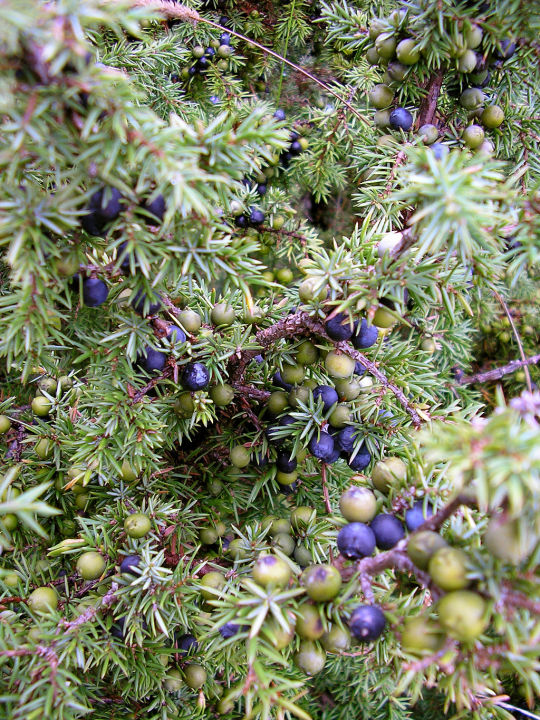
Ecology: The plant propagates when birds eat the berries and pass the seeds through dropping. It prefers sandy, rocky, or otherwise well-draining soil. It's associated with a variety of conifers, especially pines and firs. It's an especially important food source for birds, but doesn't receive much use from larger wildlife.
Myth and Legend: Juniper doesn't have a particularly strong presence in ancient mythology, which is surprising, considering its widespread nature and uses in medicine. It was thought for a while that Junipers were mentioned on several occasions in the Old Testament, but they mostly proved to be different plants. The only exception is 1 Kings 19:5-18, where the prophet Elijah shelters under a juniper while in hiding. So what's left? There is a small amount of much more local folklore about Juniper. In Germanic and Celtic regions, Juniper had an ancient history as sacred tree, and therefore was though to be unlucky, a fate that many formerly holy trees experience. One was not to plant a Juniper next to another unlucky tree, nor bring Juniper inside, nor chop it down without permission, as it was sure to bring catastrophy to the family. In the Germanic regions Junipers were passively associated with dwarves, as they were sometimes thought to have much knowledge about them. The yellow spores of Juniper, which sometimes travel through the woods in big clouds, were seen as a blessing upon the woods. There's a lot of Christianized Juniper folklore as well. That Christ's cross was made of Juniper (which would have been impossible), that he rose to heaven from atop a Juniper, that the voice of God commanded Christians not to fell Junipers, that Judas hanged himself from one, etc. These are all indications of holy status in the pagan faiths, which translated into the Christian era. Juniper is also sometimes portrayed as a tree of death and resurrection in European fairytales.
Religion: The Juniper plays only a passive symbolic role in Christianity as a tree of protection from persecutors. We can deduce from how the Juniper has persisted throughout time that it was once a sacred tree to the Germanic peoples. We know it was also sacred to Mediterranean pagans, especially the Romans and Hellenics. They would often substitute burning rosemary for burning Juniper for all matters to do with the underworld, death, and cthonic deities, and carve idols out of Juniper wood. It was also used for communication or summoning of monsters. Medea, priestess of Hekate, is said to have used it.
Magical Application: Juniper is quite prickly to the touch, and enjoys a status as spirit/demon-repelling plant for that reason. It is also fairly aromatic, which was also associated with repelling spirits. It is among the most famous protective plants in Europe, because of its many traits that make it so suitable. Juniper hung from doorways and the like was said to repel witches, and enchanting oneself with it would help one recognize them. All in all, a very strong protective and repellant plant, suitable for everything concerning keeping spirits away, and curing curses. It was also used for fertility rituals, especially in the continental Germanic regions. The way in which it was done was not up to snuff in terms of modern ethics (it was used as switch to beat the subject of the spell with, primarily), but it could still lend itself exceptionally well to fertility magic of all kinds. Because the plant is so sacred, it can easily be used to bless things or devote them to your Gods. It was also used in divination at times. Gin and other drinks made with Juniper berries were believed to make one more capable of divination or give prophetic dreams.
Magical Healing and Medicine: Juniper berries are rich in terpenes, volatile oils, tannins, sap and bitter components. It works as a disinfectant and diuretic, the latter function of which is the most crucial in folk medicine. Juniper leaves also harbor fungi which are stronly anti-fungal, which are now FDA approved to treat fungal infections. Much less scientifically, both Native Americans and Europeans have long used Juniper berries as a contraceptive and abortaficent. Since antiquity it has been prescribed to tone the uterus, or, in larger doses, cause "births under the saving Juniper," a euphemism for an intentional miscarriage. As medicine, because it was so magically repellent, it was especially well used to treat illnesses of a magical sort, but it might also be used for your usual remedies against fevers, warts, etc. Transfer magic would likely work well on Juniper trees. Juniper has a long history as healing plant and medicinal herb, definitely worth exploring.
Practical Applications: Juniper wood lends itself very well to carving. The berries are used to make Gin and other Juniper-based drinks, and are used a lot in cuisine. They aren't very good to eat raw, as they are quite bitter, but dried and crushed they are frequently used to improve stews, gamey meat, etc. Do not consume more than the equivalent of about 15 Juniper berries a day, as it could have negative side effects and cause damage to internal organs.
**This is a shortened version of the pages I offer on my ko-fi. You can commission any custom research project, but this is an extremely simplified version of my herbarium page. Please consider commissioning me if you would like to receive a much longer portfolio like this, with a source list, many more images, and much more information! I do custom discounts for repeat customers.
#apothecaric allerlei#herbarium#folk magic#folk witchcraft#witchblr#folk medicine#animism#plants and herbs#green witch#herbalism
41 notes
·
View notes
Text
Laur's Field Notes: Aron Line (#304 - #306)
Scientific Name: Triceratops ferrum
Species: Iron Armor Pokémon
Average Wild Lifespan: 70 to 80 years
Habitat
One of the few lines left from the Cretaceous period, members of the Aron line make their homes in/on rocky mountains and caves. Though primarily found in the Hoenn region, the Aron line can be found in Sinnoh, Unova, Kalos, Alola, and Galar. A small breeding population has also been introduced to the Johto Safari Zone.
Diet
The Aron line is herbivorous, with ores and mineral-rich soil making up the bulk of their diet. They have also been observed eating various forms of plant matter, such as grasses, leafy greens, branches, and tree bark.
Social Behaviours & Reproduction
Members of the Aron line are solitary Pokémon and typically only come together during their mating season, which takes place from April to early May. This line exclusively lays eggs, which take 5 to 6 months to hatch.
Clutches for this line can contain up to 8 eggs, though 4 to 6 is considered average.
When it comes to territory, Aron are fairly easygoing and don’t mind sharing their home ranges. However, Lairon and Aggron are territorial, and this can lead to rather intense battles. Lairon/Aggron will share their territories with Aron no problem, and males may even tolerate some overlap with unrelated females but, as mentioned above, they do not form long-term social groups.
Variants
The colour of an Aron/Lairon/Aggron’s plate armour can change depending on the ores that make up their diet. For example, the plates of an individual that frequently consumes copper may be reddish or orange-ish, while an individual with a diet high in gold may have golden plates.
14 notes
·
View notes
Text
Our 5 acres in western WA is called Laughing Coyote Homestead, which is perfect, because we're definitely within range and soil type to bring in endangered native prairie and oak savanna ecosystem plants, and coyotes are also known as prairie wolves. It's all coming together.
If anyone wants to buy us seeds or starts native to WA prairies (the dry rocky glacial till soil type) I will make sure to put them to good use here. I don't want our land to just be for us, I want it to be for others, and starting with bugs is a good step. Plants are the scaffolding for insects.
39 notes
·
View notes